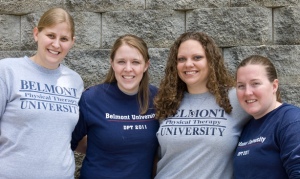 Earlier this year four physical therapy students at Belmont wrote a proposal to the Tennessee Physical Therapy Association asking for $990 to fund their research. Lauren Clark, Laura Green, Carrie Rorick and Ashley Vidrine requested this money for their research on the comparative advantages of the Manu Brace versus “a standard wrist split in the treatment of Carpal Tunnel Syndrome”.
Earlier this year four physical therapy students at Belmont wrote a proposal to the Tennessee Physical Therapy Association asking for $990 to fund their research. Lauren Clark, Laura Green, Carrie Rorick and Ashley Vidrine requested this money for their research on the comparative advantages of the Manu Brace versus “a standard wrist split in the treatment of Carpal Tunnel Syndrome”.
Carpal Tunnel Syndrome, they explain in their proposal, is “a compression of the median nerve at the wrist, which leads to hand pain and weakness, with a loss of functional activity for many of those afflicted with this pathology”. They note that “conservative measure employed to treat the symptoms of CTS commonly and historically have included the standard or neutral wrist split designed to limit wrist flexion”.
Their argument however, asserts that the Manu Brace “has been shown to improve symptoms over time” as it relieves “pressure on the Carpal Tunnel by compressing the metacarpal bones in the hand”. They state that no comparative studies have been performed to asses which treatment is more effective and propose that they be the ones to finally put this question to rest. The problem: the Manu Brace costs a staggering $150 compared to the traditional wrist brace coming in between $15-40. The Solution: a grant from the Tennessee Physical Therapy Association.
Thanks to a great idea, sound research and a well written proposal Clark, Green, Rorick and Vidrine received a check for $1,000 and a letter of acceptance from the TPTA granting them a chance to prove their theory. When asked how the study is going Lauren Clark stated, “the study is going ok. We had to wait on the grant before were able to fully recruit for the study since we only had a few splints and did not have the money to buy the supplies we needed.
We also had to make some changes to the proposal since the School of Physical Therapy is moving to the new Inman building over the summer”. She adds that receiving the grant was “a very great feeling…because it meant we would be able to conduct our research the way we had intended and planned for. We are very thankful to the Tennessee Physical Therapy Association for awarding us the funding”. Their final presentation is to be submitted in 2011.
